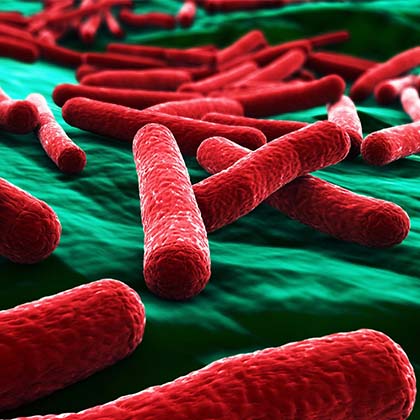American old woman died of "super bacteria": all of them were resistant to 26 antibiotics.
The emergence of "super bacteria" indifferent to all existing antibiotics is no longer just a doctor’s worry, but a fact.
According to The Paper’s report on January 17th, recently, the Centers for Disease Control and Prevention (CDC) published a case report-in Reno, Nevada, USA, a 70-year-old woman was infected with carbapenem-resistant enterobacteriaceae (CRE) and became resistant to 26 antibiotics available in the United States.
Carbapenem antibiotics are generally considered as the "bottom card" for human beings to fight bacteria at present. The emergence of "super bacteria" is because with the uncontrolled abuse of antibiotics, bacteria are resistant to antibiotics faster than the replacement of antibiotics.

Carbapenem-resistant Enterobacteriaceae
This woman lived in India for a period of time. Because of the thigh fracture and the infection of thigh bone and hip caused by it, she was treated in hospitals in India many times. In August 2016, the woman who had returned to the United States was diagnosed with systemic inflammatory response syndrome in a hospital in Reno. During the period, the attending doctor used 14 kinds of antibiotics, but the woman’s condition did not improve. Until the beginning of September 2016, the situation turned sharply and the sick woman died.
Only after the hospital sent it to the Centers for Disease Control and Prevention in the United States did it know that the bacteria infected by the woman were not only ineffective against 14 kinds of antibiotics, but were resistant to all the existing 26 kinds of antibiotics in the United States.This makes the doctor helpless.
After learning that the woman was infected with carbapenem-resistant Enterobacteriaceae, the local hospital took timely isolation measures and strictly screened the medical staff. Fortunately, the woman has been in an independent ward.
The bacteria infected by this woman are called "nightmare bacteria" because of "full drug resistance".If it is widely spread, the consequences will be unimaginable. The local hospital inspected all the people in the hospital during the period, but fortunately there was no sign of the spread of carbapenem-resistant Enterobacteriaceae.
Recently, however, a study published in the Proceedings of the National Academy of Sciences shows that the spread of carbapenem-resistant enterobacteriaceae may be going on in a secret way, because patients with this bacteria may have no symptoms.
The researchers extracted about 250 samples of carbapenem-resistant Enterobacteriaceae from patients in four hospitals in the United States. The analysis showed that the rich drug-resistant genes contained in the samples were easily exchanged among different strains. Although the researchers found no evidence of drug-resistant bacteria exchange, they saw many kinds of carbapenem-resistant Enterobacteriaceae bacteria. In the absence of any symptoms, drug-resistant bacteria may have spread covertly.
"Carbapenem-resistant Enterobacteriaceae bacteria are like invisible killers, because they don’t get sick as soon as they get infected like Salmonella," Tim Johnson, an expert on antibiotic resistance at the University of Minnesota in the United States, compared "superbacteria" to a faucet that drips slowly. "It doesn’t cause symptomatic diseases for a long time, but lurks in the body."
According to CNN, there are two types of carbapenem-resistant enterobacteriaceae, one is "New Delhi Metal-Beta-Lactamase (NDM)" and the other is "Klebsiella pneumoniae (KPC)", and the dead woman in Nevada was infected with NDM. Generally speaking, compared with NDM, there are more patients with KPC in the United States. As of January 6, 2017, there were 175 cases of NDM recorded by the US Centers for Disease Control and Prevention.

New Delhi metallo-β-lactamase type
"This case is very important because it tells us that even though this situation is rare, it still happened, which sounded the alarm for us." Randall Todd, director of the Department of Epidemiology and Public Health Prevention in the county where the woman lives, told the Huffington Post that this was the first time he had met a fully drug-resistant patient.
In fact, this is not the first case of "superbug" infection in the world or in the United States. In May 2016, US health officials reported that a 49-year-old woman with urinary tract infection in Pennsylvania was resistant to all known antibiotics. This is considered to be the first case of "superbug" infection in the United States. The woman had no experience of leaving the country within five months before the onset of the disease.
According to estimates by the Centers for Disease Control and Prevention, there are about 9,300 patients infected with "superbugs" in the United States every year, and about 600 of them die. A survey report by the British government shows that if people ignore the problem of antibiotic resistance, by 2050, it is estimated that 10 million people worldwide will die of "superbugs" every year.

Klebsiella pneumoniae type
In 2015, the World Health Organization (WTO) launched a global action plan, calling on countries to pay attention to drug resistance and ensure the rational use of antibiotics. However, in some countries, effective management mechanisms have not yet been established. In India, antibiotics are often used to treat diarrhea.
Superbacteria has become a global problem, and many infected people have returned to China after being infected in countries with backward sanitary conditions. In 2010, a Belgian man infected with superbugs died in Brussels, which was the first reported death of superbugs in the world. According to Agence France-Presse, the man was infected while being treated in a hospital in Pakistan. Hospitals are "storage tanks" for drug-resistant bacteria, and the number and variety of them are frequent places for "superbugs". In the same year, Japan confirmed for the first time that a male patient who returned to Japan from India was ineffective against most antibiotics.
For ordinary people, what are the ways to protect themselves in the face of "super bacteria"? Washing hands frequently, getting vaccinated and eating safe food can keep you away from "super bacteria" to a certain extent. Wash your hands frequently, especially. This advice, which has been hung in your mouth since childhood, is an effective way to prevent infection with "super bacteria". However, the above methods only deal with the spread of "super bacteria", and cautious and restrained use of antibiotics is the source.
(Wang Yingying)